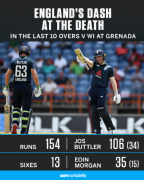|
At one stage during the massacre of St George's - as this match should probably be known - the Grenada Prime Minister, Keith Mitchell, walked around the boundary waving at the crowd. It was hard not to fear for his safety a little. As Chris Gayle and Jos Buttler, among others, provided demonstrations of the wonders of modern batting - both hit the ball cleanly and powerfully in amassing 26 sixes between them - you wondered whether an agent might have to leap in the path of one of the shots, not so much taking a bullet to save him as taking a ball. "Things that once seemed impossible are now happening by the week. The game has changed," Gayle said with a rueful smile afterwards. It sure has. The statistics from this match are eye-watering: never had West Indies scored so many in ODI cricket; never had any side made as many in the Caribbean as England managed; never has an ODI seen so many so many sixes and never has a side hit as many sixes as the 24 England managed here. The winning score was the ninth highest score in ODI history, England's third highest and the fourth time they have made 400 since June 2015. It was the sort of easy-paced, unforgivingly flat wicket with which batsmen could fall in lust. Bowlers are involved in such games in the same way pheasants are involved the 'sport' of shooting; foxes are in the 'sport' of fox hunting and fish are in the 'sport' of fishing. It was, as England captain Eoin Morgan said afterwards, "as tough a day as we've ever had". "It was 100 overs of intense, crazy cricket," he said. "It's something we have never come up against before. The West Indies are a lot stronger than the rankings suggest, so it's been a great challenge for us." The plaudits, naturally, will be taken by Buttler and Gayle. And it is true, both men, with their fast hands, their power, their timing and their range, played remarkable innings. While we have become accustomed to innovation in white-ball cricket, it was noticeable that both men scored the bulk of their runs - and all of their sixes - in the areas between from long-off and mid-wicket. Neither of them hit a six behind square on either side of the wicket; a sign, perhaps, that the bowlers pitched too full. But in a match dominated by batsmen, it was arguably the bowling of Mark Wood that provided the defining contribution. When he was recalled to the attack, West Indies were 220 for 2 after 23 overs and required 199 more from 27. They had broken the back of their unlikely chase and England's captain, Morgan, had nowhere left to turn. At that point in the game, Wood had taken 2 for 23 from five overs and the rest of England's attack had bowled 18 overs for the cost of 195 runs without taking a wicket; a rate of 10.83 an over.  Within three deliveries, Wood's extra pace had claimed two key wickets. Both Darren Bravo and Shimron Hetmyer - ridiculously, caught on the boundary second ball for six - attempted to pull short deliveries but were hurried and mis-timed their strokes. Not for the first time on this tour, the benefit of Wood's pace - he reached a top-speed of 90.6 here; the quickest recorded on either side - was abundantly clear. "That over changed the game," Gayle said later.
Within three deliveries, Wood's extra pace had claimed two key wickets. Both Darren Bravo and Shimron Hetmyer - ridiculously, caught on the boundary second ball for six - attempted to pull short deliveries but were hurried and mis-timed their strokes. Not for the first time on this tour, the benefit of Wood's pace - he reached a top-speed of 90.6 here; the quickest recorded on either side - was abundantly clear. "That over changed the game," Gayle said later.
This may have been another day that did the World Cup hopes of Jofra Archer - a bowler of similar pace to Wood - no harm. The rest of England's attack - with the admirable exception of Liam Plunkett, whose height and variations rendered him the most economical bowler of the match - simply had no answer to Gayle. To be fair: on this surface, not many would have fared too much better. It was a point acknowledged by Morgan afterwards. "It's difficult to tell when there's one short boundary, it's an incredibly good wicket and Gayle is in that form. But we must strive to be more accurate and produce more better balls." Chris Woakes and Ben Stokes, in particular, endured tough days: Woakes conceded 91 from his 10 overs (only three times have England bowlers conceded more), struggling to hit the right length, or even the pitch at times, and Stokes 77 from his eight, though he did return to claim the key wicket of Gayle. Equally, though, none of West Indies' bowlers had an answer to Buttler. At one stage he scored 48 in 10 balls - the result of 10 successive boundaries - going from his 50 to his 150 in just 31 balls. It was an innings that AB de Villiers and, perhaps, a handful of others in the history of this format could have played. It was that good. It helped England plunder 154 from the final 10 overs of their innings. Only once in the history of ODIs has a side - a de Villiers-inspired South Africa thrashed West Indies for 163 from the final 10 in Jo'burg in early 2015 - has a side scored more in that last portion of an innings. It may not be coincidence that Jason Holder was a member of the attack on both occasions. He is a man with many qualities; suffice to say death bowling is not one of them. There were other aspects of this game that were pleasing for England. Jonny Bairstow and Alex Hales (playing instead of Jason Roy, who had a hamstring strain) provided the perfect start, with Hales underlining the power of England's bench strength, in batting at least. And Morgan's first ODI century since May 2017 sustained a remarkable run of form that has seen him average 114.80 at a strike-rate of 101.41 in his last 10 games in this format. His poor form was a major impediment to England's chances at the last World Cup - he suffered two ducks in five innings and failed to make a fifty in the tournament - so to have him in such form represents a huge improvement. His coolness in the dying moments of this game, too, was impressive: if he had any doubts when Carlos Brathwaite and Ashley Nurse were adding 88 in 12 overs, he kept them to himself. And, while he was expensive, Rashid showed his value in claiming four wickets in an over - four in five balls to be precise, with the first ball of the over a dropped catch - to finish off the tail. It is exactly the role he is employed to fulfil and, in claiming five wickets (admittedly the most expensive five-wicket haul in ODI history) to add to Wood's four, he demonstrated the importance of having wicket-taking bowlers in this format. There remains something of the Kevin Keegan-managed Newcastle about this England side: they know they will concede, but they back themselves to score one more than the opposition. Whether it's enough to win the World Cup remains to be seen, but it may be just a little unsettling that they are conceding such scores against a side that, for all its talent and improvement, is rated No. 9 in the world and only just scraped into the tournament via the qualifiers in Zimbabwe. England sure pack a mighty punch, but they look just a little susceptible to counter punches.
|

